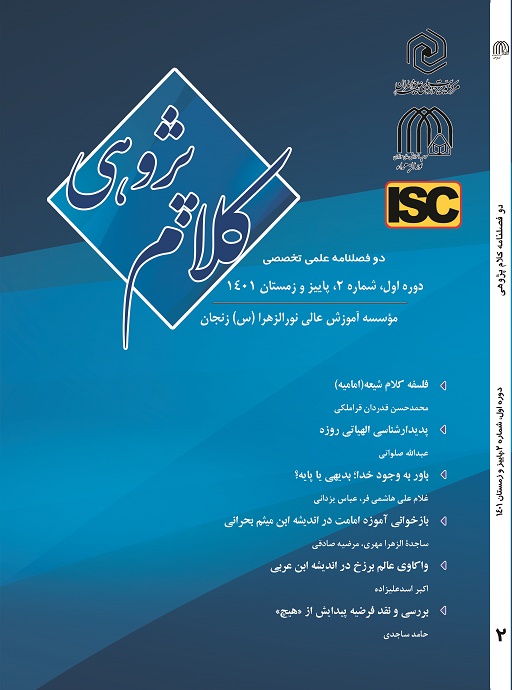نوع مقاله : مقاله پژوهشی
نویسنده
استاد فلسفه دانشگاه تربیت دبیر شهید رجایی،
چکیده
پدیدارشناسی به نوعی بازگشت به آغاز و سرچشمههاست و اقدامی در راستای از سرگیری ارتباط زنده با واقعیت. همچنین، پدیدارشناس سعی میکند با گامهایی همانند تعلیق و تقلیل ایدتیک و تقلیل پدیدارشناختی به روایت هوسرل و تقلیل، تقویم و ساختارشکنی از نگاه هایدگر و دیگر مؤلفهها، ارتباطی نو و زنده و فعال با امور برقرار کند. پرسشهای اساسی این پژوهش عبارتند از: پدیدارشناسی الهیاتی چیست؟ و چگونه میتوان روزهداری را بنابر رویکرد پدیدارشناسانه الهیاتی تحلیل کرد؟ برخی از دستاوردهای این تحقیق به این قرار است: یکم. در پدیدارشناسی الهیاتی به روایت نگارنده، قلب محور پیشاتأملات و عقل به مثابة شأن قلب، محور تأملات و خدا راهبر کلیت پدیدارشناسی است؛ دوم. پدیدارشناسی الهیاتی، سه گام اساسی دارد: پس زدن قلب از خویش و نماها و پدیدارهای مألوف، پس زدن قلب از جلوههای قدسی و عطف توجه به سرچشمة جلوهها، و ترجمة دریافتهای پیشاتأملی به ساحت تأمل به مدد عقل؛ سوم. مؤلفة دیگری که در پدیدارشناسی الهیاتی نقش اساسی دارد انسان کامل است و دقیقاً به همین دلیل، آیات و روایات در پدیدارشناسی الهیاتی سهم مهمی دارد. چون آیات و روایات بنوعی کشف تام و اتم انسان کامل است؛ چهارم. بنابر نگاه پدیدارشناسانه الهیاتی میتوان در مقام ترجمه و تأمل عقل، آیدوس روزهداری را حضور و مراقبه و تسلیم دانست که با نهادینه شدن این آیدوس در زندگی، زندگی ما سراسر روزهداری میشود؛ پنجم. پدیدارشناسی الهیاتی بیان امر ناپیدا و نادیدنی پنهان شده در آن چیزی است که دیدنی است. در فرایند نجات پدیدار، روزه منحصر به یکی یا چند جلوة محدودِ این جهانی یا فراطبیعی نمیشود. به عبارتی، پژوهشگر در تأملات پدیدارشناسانه باید تمهیداتی را رقم زند تا جلوهای از روزه، جلوههای دیگر را مستور نکند.
کلیدواژهها
عنوان مقاله [English]
Theological Phenomenology of Fasting
نویسنده [English]
- abdollah salavati
استاد فلسفه دانشگاه تربیت دبیر شهید رجایی،
چکیده [English]
Phenomenology is a kind of return to the beginning and the source and an action in the direction of resuming the living relationship with reality. Also, the phenomenologist tries to establish a new, alive and active relationship with things with steps such as suspension and eidetic reduction and phenomenological reduction according to Husserl's account and reduction, calendar and deconstruction from the point of view of Heidegger and other components. The basic questions of this research are: What is theological phenomenology? And how can fasting be analyzed according to the theological phenomenological approach? Some of the achievements of this research are as follows: 1. In theological phenomenology, according to the author's account, the heart is the focus of pre-reflections, and the mind, as the dignity of the heart, is the focus of reflections, and God is the guide of the whole of phenomenology; Second. Theological phenomenology has three basic steps: withdrawing the heart from self and familiar appearances and phenomena, withdrawing the heart from holy manifestations and turning attention to the source of manifestations, and translating pre-contemplative findings into the field of reflection with the help of reason; Third. Another component that plays an essential role in theological phenomenology is the perfect human being, and precisely for this reason, verses and traditions play an important role in theological phenomenology. Because the verses and narrations are a kind of discovery of the whole and the atom of a perfect human being; Fourth. According to the theological phenomenological point of view, in the position of translation and reflection of reason, the Eidos of fasting can be seen as presence, meditation, and submission. the fifth Theological phenomenology is the expression of the invisible and invisible hidden in that which is visible. In the process of phenomenal salvation, fasting is not limited to one or more aspects of this world or supernatural. In other words, the researcher in phenomenological reflections should make arrangements so that one manifestation of fasting does not hide other manifestations.
کلیدواژهها [English]
- Theological Phenomenology
- Heart
- Intellect
- Perfect Human
- Fasting
- Presence
- Infinity

